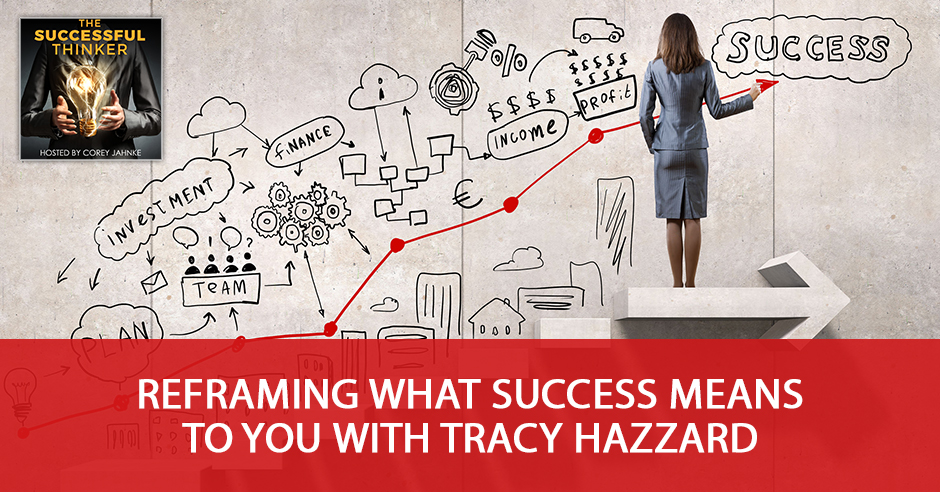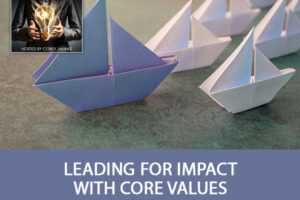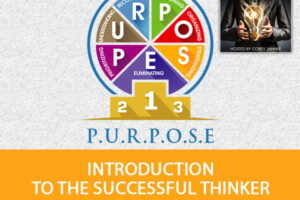
Customer-focused businesswoman and truly successful thinker Tracy Hazzard and podcast host Corey Jahnke have a frank discussion about what success means to different people and how to stay fully grounded so that you are able to enjoy the journey along the way and reach the goals you set for yourself. Tracy shares her mindset about product development and content strategy and why her family (including her puppy) help her stay focused on what truly matters in life. A lot of entrepreneurs believe that family time is something that they should not miss despite their busy schedule and the demands of their work. However, not all entrepreneurs know how to balance time for work and time for other aspects of their life. Tracy is a brilliant thought leader who has managed to “hear her own thinking despite having a noisy head” as well as maintain real focus when she is with those people she cares about most.
—
Listen to the podcast here:
Reframing What Success Means To You with Tracy Hazzard
How To Reach Your Audience At Home And At Work
I’m honored to have the guests that we have with us. As you know, one of the principles of being a successful thinker is that we don’t believe in the idea that you have to learn how to do more with less in the corporate environment. What you want to do is learn how to do more by becoming more. Tracy Hazzard has put it out there as to how a person can be a lot of things to a lot of people by leveraging the people that she works with and the people that work for her and the systems. She’s great at helping set up systems that make a person like me, for example, able to have a podcast. Tracy is an Authority Magazine and Inc. columnist and the co-host of the top-ranked podcast Feed Your Brand which is one of CIO’s Top 26 Entrepreneur podcasts, Product Launch Hazzards for inventors and e-sellers, WTFFF?! for 3D print innovation. The blockchain venture exploring podcast, The New Trust Economy, was recently featured on Larry King Now with a constant stream of content and products from her Brandcasters authority platform, which is called Podetize. I use Podetize myself and I’ll tell they’ve really put together an awesome system here. She influences and casts branding content and $2 billion’s worth of product and innovations all around the world. Tracy, welcome to our podcast and thanks so much for being here.
Thank you, Corey, for having me. I’m excited to be here. I love your topic, The Successful Thinker. I love that.
You were somebody who really gave me a lot of confidence that The Successful Thinker had a lot of value out there. Can you tell me a little bit about how you got started into having so many plates in the air?
I don’t know if I ever just got started or I was always like that from birth. I’m going to admit this and my father will probably see this and laugh. From a young age, my nickname was, “Tracy Do”. The “Do” part was because I would be saying, “No, daddy. Tracy do.” I was always doing stuff. I think that that has been an inherent part of who I am like, “I want to try that. Of course, I’ll do it.” It’s that curious personality and also feeling completely capable and competent. That is something definitely my parents instilled in me early on.
One of the things that we believe is that you have to keep going and then figure it out along the way. I think it was J.P. Morgan who said, “Go as far as you can see and when you get there, you’ll be able to see further.”
I don’t live in a world of impossibilities ever. It doesn’t occur to me that it’s not possible to learn something, do something and try something. I don’t think that failure matters. It’s never mattered in my life ever. It’s always an opportunity to learn something new.
If I say something here that impacts somebody or changes somebody's life, it has a ripple effect. That's what I'm thinking about. That's how I measure success. Share on XI don’t think that failure matters. It’s a funny thing, I’m pretty much an expert on falling on my face.
There are a lot of us out there, believe me.
I’m still here at 53. I feel that a lot of times when I was going through something, it seemed painful at the time, but I feel a lot stronger than I ever did.
I come in a design world. It’s through failure that you see the possibility for invention and opportunity. If it doesn’t fail, you don’t actually know if it’s going to be good enough or not.
That’s really a great way to look at that. That’s your thought process. We’re going to step in and then we’re going to fail. Where do you go from there?
The reality is that I don’t look at it as, “We’re definitely going to fail.” I don’t worry about it if that’s the outcome because that’s a yes or a no. It is an outcome, so it means try something different. I look at something as going into it. I pretty much approach everything with a bunch of research at the very beginning. I believe strongly in research, whether that’s just reading up on what the industry’s about or what’s the particular thing you want to learn, listening to podcasts, watching videos or whatever that is. I believe in creating very broad basis research of understanding to start out with. I think when you come into something completely cold, you’re actually going to make misjudgments about failures. You won’t understand that was a failure of something I attempted that didn’t work out. Instead, you maybe made a rookie error and you go, “That’s not worth it.” You make the wrong choices in that process if you don’t have at least a basis of understanding of what you’re about to jump into. I believe in that strongly, to get that underneath you.

What Success Means: It’s important as a visionary to make sure that you don’t miss the present because when you do, you don’t serve people well.
Do your homework first so that if you fail, then you know what lessons are to be learned from that failure. Is that it?
Because if you don’t learn that, then you can’t see where that opportunity lies. Where do I want to innovate? Where do I want to do something different? It’s usually a very small percentage of changes you can make to something that really has an exponential result for you. To find that tiny little percent of adjustment that is going to make a significant difference or make something inventive and innovative, you have to have enough knowledge of the rest of the 96% to really get there.
That makes me think about what Brian Tracy talks about. He says that whenever he was going to start a new business, he would go ahead and just literally consume everything that there was to consume. Some people say opportunity is everywhere, but I sure don’t see it. Maybe describe the way that people can see it more.
I see opportunity all the time when I design products. I design products that you’ve bought at mass-market retail: Costco, Walmart or Target. That’s the core of what I did for several years. Now, I do a lot more podcasting as you know as content is a lot more of my world. Prior to that, when I look at the products out there, the biggest opportunities are when you read a review that describes how it failed and how it didn’t fit or how it doesn’t work. When somebody breaks something, misuses something, that’s an opportunity for improvement in quality. That always is an opportunity at looking at the negative space, I would call it. Looking into things that went wrong instead of saying, “This product is not worth it.” Look at that instead and saying, “How can I make this better?” When you look at the world from that perspective, all you ever see is opportunity.
You just described one of my favorite concepts, which is you can either be a problem solver or a problem creator in this world.
I agree with that. I think I tell that to my daughters frequently.
It’s through failure that you see the possibility for invention and opportunity. Share on XWhat you’re doing is you’re approaching life from a success orientation. How can we make things better than when we found them? That must be really a core value for you. To give us a context of what your values are, can you tell us what the word, success, means to you?
It’s not an end goal. I think that’s part of why I look at that as different words. I think it has such a powerful meaning because, for me, success is a process onto something. It’s not an end goal in and of itself. It has such different meaning for every person out there. To me, if I’m energized, if I’m excited about what I’m doing, if I feel I’m in my element, that’s successful. It’s not about money, it’s not about having a house and it’s not about any of those things. Some of the times that I’ve felt the most successful were something I did for free. I come off of it and I go, “I just got to do exactly what I wanted. I just got to be exactly who I am and show that off and I just got to live to my full potential.” To me, living up to its potential as a success, that is the same thing with a successful product. We have a product that we call our Platinum Record as if you were an album creator.
Our Platinum Record is a product that sold for seven years at Costco and it sold for $99. It was an office chair that sold for $99 which is a really inexpensive and hard thing to achieve. It sold for seven years straight and did more than $20 million a year for our client. I consider that absolute success because every single person that bought that loved that chair. They used it, they sat on it and they used it again and again. The chair’s lasted way longer than they should have for a $99 chair. I know I was successful. The success was really, “Why would Costco keep it in if it wasn’t working?” That, “Bought and used again and again,” is my product criteria for success. I think of it the same way. If I’m selling a coaching package, if I’m selling Podetize, if I’m selling any of those things, if it’s bought and used again and again and people rave about it, then I’ve done my job.
One of the things that I truly personally believe is that so many people are giving away a large part of life waiting to get there instead of walking along the road and smelling the mindfulness that’s all around us. All the great opportunities that we have to help people and the way that we can indeed have these repetitive business successes as we go and growing them into bigger and better things sometimes. How do you do that when it comes to your relationships and so forth? What makes you feel successful that way?
I want to just say briefly that I live in a world of vision and future because that’s what being a designer and what being creative is. It’s like, “What is my future going to look? What does my business going to look in the future?” I do live out there as a visionary. It’s really important though as a visionary to make sure that you don’t miss the present because when you miss the present, you don’t serve people well. You don’t deliver now and you’re like, “I’ll deliver that tomorrow.” I always want to do that. That translates into my personal life really well because I’ve got kids. I’ve got a puppy. You cannot afford to not be present with them. They don’t allow it. They will call you out on it. Look on your floor, that’s what puppies do. I’ve just discovered if I’m not paying attention, that’s it. They will force you back into that. I think for me, that has just been the ongoing thing is having myself surrounded by kids and family and fun and pets and you’re doing all of that keeps you totally grounded because they won’t take it. They’re not fans. You’re supposed to be their fan. That, to me, is success. If they’re happy and they’re well-adjusted and they’re living up to their potential, then that to me is successful as a parent.
It sounds to me that you’ve found an insulator against personal dissatisfaction that plagues a lot of entrepreneurs and product designers. You’re always never really satisfied with what you’re doing because you see the future out in front of you.

What Success Means: A fast way to gather knowledge is to interview people, to pick their brain, and to get to know them.
It’s very true. There’s a lot of that, especially with visionaries. I see it all the time with a lot of the people that I work with. I have found a place for myself with that, but that doesn’t mean that it doesn’t creep in for everyone. It’s like, “I’m not achieving the success that I thought I had. Why didn’t we come away from that trade show with enough clients?” There’s always that goes on in their mind. Instead of delving into that, what I like to do is just look at that and say, “That was the result. Now, what was the missing piece? What didn’t happen? What can I fix next time?” When you live in the opportunity of adjustments, of fixing, flexing, pivoting, doing whatever is necessary to improve, it’s a continuous improvement. That’s what we do with products. We’re always improving the product. It’s never done. When you live in that with yourself as well, you look at that, it’s just an opportunity to improve.
That keeps you pulled back from the future into the now with an eye going forward. How do you go about strategically setting up the next months?
We’re big planners here. Hope is not a plan. It’s our business motto. We don’t believe in just hoping that things will work out. It requires a plan. Does that mean that you’re going to stick to that plan and it’s so narrowly defined and all that? No. We also believe in constant adjustment. If you don’t plan things, if you don’t think about that, then you may miss opportunities. You may not have the cashflow you need. Your business may not be sustainable if you’re not continually planning. We plan on a quarterly basis. We plan on a yearly basis and we plan for three years out. We try not to go beyond that because too much change in industry and technology in more than three years. It’s just conjecture.
One of the things I think that I’ve noticed that the Podetize team does a very nice job of is statistical analysis or keeping an eye on what are the actual results. Is that something that you focus on?
The number is different for everyone. That’s really where you can’t just say, “My podcast is this statistics.” I have a brand new podcast that started called The New Trust Economy. It’s on blockchain. I started at the end of January and within a month, I was asked to be on the Larry King Now Show. If I looked at my numbers, no one would ever invite me on the show. I didn’t even have a thousand audience because I never promoted the show. I started it, but we didn’t have a promotion plan. Our promotion plan wasn’t going to start until March. We were just pre-launching. I happened to interview a guest who was going on the Larry King Now Show and the producer saw it and said, “Let me invite her. We need a woman on the panel. Her interview was very insightful. Let’s invite her on.” That’s how I got in. I look at success as a different model. If I look just at my numbers, that wouldn’t mean something to me. That wouldn’t have a direct effect on my business, on the publicity, on the things that were really important to growing my brand and growing who I am. It’s different for every person and that’s really where we get into these statistics and numbers. Yes, it’s important to pay attention, but I think you’ve got to know the one thing that matters most to you and to your business.
That’s a tremendous thought because one of the things that you’ve architected for me already is what successful thinker, Seth Godin, talks about which is the idea of shipping. What you did, the way I understood you is you shipped this show trying to figure it out as you go and all of a sudden, an opportunity presented itself that probably you never thought is going to be there.
You got to know your one thing, the one thing that matters most to you and to your business. Share on XSometimes that’s what a show is for. When we originally first started our very first show, it was an experiment and I treated this one the same way. It’s a learning journey for me. I had been working in the Blockchain for only about eight, ten months, somewhere in there. It’s part of a future plan, part of the three-year plan for our prototypes business. I’m in a knowledge-gathering way. What I found was a fast way to gather knowledge is to interview people, to pick their brain, to get to know them. I can serve them as well by giving them publicity because I know how to do that. By providing a service and getting an opportunity to talk to someone who I’d like to learn something from, that’s my extensive research.
That’s my deep research. It’s beyond just the general knowledge. I’m going deeper into understanding how can I take this and utilize it? Who should I model? Who knows what they’re talking about? Who could I use? How can I build my team and how can I get the answers that I need for this long-term vision future that I have that I believe is going to be the right thing for me? I also have to adjust and learn whether or not that hypothesis is true. Is this going to be right for me? Is this going to be right for my business and is this going to be right for my clients? That’s what it is for me. That’s why I never considered or worried about the number of fans or audience because it was really the experience of doing the interview that mattered to me the most.
You just did something that I think is a wonderful quality of successful thinkers. Not once did you say, “I ask myself how much money could I make from this.”
That’s not the first thought ever in my brain.
The impact is a great word because unfortunately a lot of people, that’s where they’re going, “How much money can I make from this?” You could probably speak for hours about how it always takes five times as long and ten times as much money. If that’s your goal point, you’re not going.
It’s not that I don’t pay attention to the money and the numbers and the margins. I always do because you can’t launch a product into the mass market retail world and lose money. That’s ridiculous. You’ll never be able to sustain that very long. My goal is always to make a sustainable business and make a sustainable product in terms of revenue, in terms of cashflow. That requires an understanding. In products, you have to have a 70% margin. Most people don’t reserve that much. They think if I make 50% on my money, I’ll be good enough. That doesn’t allow your growth. It doesn’t allow you lag time for how long it takes retailers to pay you.

What Success Means: At the end of the day, if the market’s not going to pay for it, if it’s not worth that value, then it’s a no go. Don’t do it.
I know that data deep down. I know those financials and those numbers. They’re there and they’re inherent in an evaluation of whether or not something is going to work or not. At the end of the day, if the market’s not going to pay it, if it’s not worth that value, then it’s a no go. Just don’t do it. That’s because not enough people are going to be able to buy it or access it. It is an impact decision, not necessarily just a financial one. Am I going to make enough money off of this? No. It’s thinking about are enough people going to be able to use it and be happy with that and not break the bank? Thinking about that is the way that I look at it.
I think that’s wonderful because what you’re talking about is how can I use what Bob Burg calls the second law of the Go-Giver, which is about how many people can I serve adding more value than it costs to produce this product? That’s a tremendous thing. What the audience isn’t seeing is your amazing smile when I talked to you about the value and when you’re talking. You’re just really into the person. I feel like you can visualize that audience. Is that a picture in your head or am I misinterpreting that?
No, I’m always thinking about the audience whether I’m writing or I’m speaking or on a stage or I’m talking on a podcast. I’m always thinking about that person that needs this message the most and how can I reach them. Before I come to your show, I think carefully about your show and I do some research and I listen to your show because it matters to me that I understand and I’m serving your audience. Not mine, not the person I want to connect with, but your audience because that’s my job here. That’s my role to come on as a guest and serve you first.
If I do that, it always serves me and it attracts the right people. I’m always thinking about that. I’m also thinking about if I say something here that impacts somebody and they take that and they walk away and they’d make a change in their life, that has a ripple effect out there. Most people narrowly defined is I have 1,000 listeners and that’s it. Those 10,000 listeners have 10,000 listeners or people they may impact. That is always what I’m thinking about is that ripple effect happening. If I’m only thinking about me, that’s a limited ripple. That’s a small pebble.
When we wrote The Successful Thinker, we wrote it about Cynthia. Whenever I’m doing the podcast or I’m writing an email or I’m doing the Coffee with Corey, in my mind, that’s the only person that I’m talking to. You can feel her waking up with those issues. When you do that, it’s what gets me through those sticking points. When you’re tired and you’re frustrated and maybe you had a bad day over here, you want to come into this space. It takes a lot of energy to be Tracy Hazzard. How do you go ahead and maintain your energy and do self-care with all the things you’ve got going on?
My life coach will be the first to tell you that I’m horrible at self-care, that I don’t do enough. I run at a high energy pace. That is who I am already. I’m energetic. I’m passionate. It’s who I am, but I don’t take enough breathing time. As you noted, I work late at night and I don’t sleep enough either. I have actually worked on that and that is the number one thing that I’ve changed in my life in the last few years now where I was not sleeping hardly at all. I had this mindset that I couldn’t sleep since as a child, I was an insomniac and that my brain was running on fast and it wouldn’t allow me to sleep. About a little more than few years ago, I started transcendental meditation. When I did that, within twenty minutes, I felt I completely fell asleep. I shut my brain off completely.
It is important for us to preserve time for the things that we really value and for the things that we can be amazing and excellent at. Share on XI said to myself, “That’s no longer an excuse. If you can shut your brain off in twenty minutes, then there’s no reason you can’t shut your brain off for a whole night. That’s a bad paradigm you’ve been setting for yourself. That is a bad mindset. Let’s remove that barrier.” From that point on, I fall asleep and I go to bed. I sleep nice and soundly. I think that is the biggest change in my self-care that has happened to me. Making time for my family, that’s more important to me and for a lot of people that’s a drain on your energy. It’s hard to be a mom. I look at that as that’s what actually reenergizes me. If I have a choice of my time, I’d rather not sleep, not meditate. I’d rather spend it with my girls. That’s a choice that I’m making at this stage because I don’t want to miss a minute of their time when they’re this age. My girls are almost ten and almost five and my oldest one is 24.
One of the things that I’ve seen in the pharmacy is people who are actively involved with their grandchildren because they just missed it with their time.
I have loved how active my parents are as grandparents. They don’t miss events, even horrible violin concerts. They show up and they don’t want to miss a minute of it. I also never felt my parents missed a lot of my childhood either. My dad was a big oil executive and he was busy, but when he was with us, he was present. I take that as the same model that I want to leave here is that when I’m with my kids I’m there for them, I’m not still working. I’m not on my phone. I’m listening to what they have to say and we’re spending quality time together. That’s relaxing.
It’s really a cardinal rule of the successful thinkers to be all-in wherever you are. You’re all-in while you were at work and it’s no longer selfish because you know that you’re going to be done with that. Put it away so that you’re all-in with your family.
One of the very first people I interviewed for my column in Inc. Magazine was John Assaraf. I asked him, “John, my brain is really crowded and busy and I’m afraid I’m missing the important inventions, important thoughts, the important innovations. I’m afraid I’m missing it because my brain has so much noise in it.” He said, “Do you hear your ideas?” I said, “Yes, I do. They come above the noise.” He said, “Then you know how to listen with your brain’s level of noise. Every brain is different.” As long as you’re still hearing it, it doesn’t matter how busy your brain is. It doesn’t matter how busy your life is as long as you’re still hearing it. I think when you take those breaks when you’re spending time with your family, it allows your brain to shift and almost immediately after when I sit back down to work, I’m like, “There’s that thing I couldn’t work out.” It gives us that opportunity to wash that through where I was putting too much processing into it.
One of the best ways I solve problems is taking a shower or go to the movies.
A lot of people hit the shower. I agree with that one.
I think you just said it. A mind in intention and a mind in stress really doesn’t function at its highest ability. I think that’s wonderful. I wonder though at those times when you get really stuck, how do you find the resources or the people or the things that you need to do to keep going?
I’m the luckiest woman on earth because my partner is my husband and he is always there and we have great mindshare. Whenever I’m stuck, I know that he’ll be able to pick up and help me see a new perspective. I’m that same thing for him. We consider it co-creating. The really great part is that it’s not a normal company where you have to justify that you don’t have an ulterior motive or that you have to build trust. We’ve been married for 27 years. We trust each other immensely. We have the same path. We’re going in the same direction. When I’m stuck, I can count on a really great perspective that isn’t going to undermine who I am and what I am or be in this position where it’s too vulnerable to admit that and that happens when you’re in an environment like a pharmacy as you’re talking about. You don’t want to admit you don’t know something to your coworkers, but sometimes you have to in order to move through to that next place.
I’m lucky that I can do that, that I can be that person and vulnerable and it doesn’t affect how he sees me as the CEO of this company. It doesn’t change that at all. That, for me, is my place. He’s always my first go-to and we always use that mindshare. It’s also short-hand for us because we’ve been working together for so long that I don’t have to go through the long explanation of how I got to this thought or got this crazy idea. He’s like, “Let’s hear it out.” That’s why that really works well for us, but I find that you have to have advisors. There are just some things that I can’t talk about or we stress our family. I have business things that I have to work out whether it’s how am I going to get more cashflow in so we can grow faster or how am I going to do this? They’re involved in the day-to-day. Doing that, you have to have outside resources. You have to have mentors, people you can go to.
I have people I trust that I’ve worked with again and again. That’s where I think it’s really important. It’s not you pick up a book and you think, “This person’s a guru.” I don’t believe in that. I believe in results. They may write a good game, they may speak a good game but at the end of the day, if their clients aren’t getting results and if I haven’t gotten successful results from them, that’s not an okay thing. It has to be something that’s completely repeatable with whoever they’re with or admit that this only works for technology companies or this only works for coaches. Be honest about where it works. It doesn’t just work for everyone. “Are you the right coach for me? That’s the question that I’d be asking. Have you been there, done that again and again in my industry or in the area I need you most for?
I think the greatest day of my own life was the day I realized I didn’t have to know everything. I think you’re hearing more podcast interviews and seeing more magazine articles that talk about if you’re doing this right, you’re not trying to do it by yourself.
When you put yourself in a mind of “How do I need to be?” all those other things happen, and success comes. Share on XThat’s what my podcast, Product Launch Hazzards, for other product launchers is to point that out. There are 25 experts plus four new people I interview every single month that they may never have heard of before. We just did an episode with the South American sourcing. I have never sourced a single product in South America. I learned something in that interview. When we expose ourselves to these other people who are doing other things, we start to see there are so many rookie errors in doing it yourself. There are so many problems that come up with not seeking advisors. The right advisors, half are accelerators. Time, especially in this marketplace, the timing for your products, services, content, all of those things are essential. If you’re not getting it out now, your opportunity might be missed.
One of the things that happens is that when we realize that we’re a player on the team, were able to keep our own value front to the center. For me, I work at this hospital with these incredibly smart young pharmacists that are so good at a clinical pharmacy that it just about makes me wonder why I’m even in the room. There are times where they’ll call me and say, “We’ve got this lady and we need you to talk to her because we don’t know what to do with her.” It was a while before I really realized that when you take that into any business and realize that if I’m okay with my talents and I’m okay letting them compliment my talents because they have these talents that are weaknesses, then you come to find out that everything works like that. There’s always somebody that loves to do excel spreadsheets. Using those people actually does a couple of things. What do you think those things are?
It’s an interesting model. I like to live in both places where I am an expert and I can add a lot of value to people and provide that. I also like to live in a place where I’m learning something and I’m putting it into perspective. That part of it was I did start my Blockchain podcast because as I said, I was learning. I was experimenting. What I do know that I’m good at is asking good questions. As you ask good questions and you start to frame that into the mindset of, “How can I be a service? How does this apply? How can I utilize this?” What you find is that ability to take these pieces that other people are so great at and put it together into a package that just makes a wonderful product, a wonderful system, a wonderful company or even a wonderful book and viewpoint.
When you look at that altogether, that in and of itself is an amazing skill set. Being able to assemble the right teams and build all of that is of a higher power than actually having the skill itself. I always think back to all the stories about people who build these companies and they’re not an expert in anything like Henry Ford. He’s like, “I’ve got all these people at the touch of a button and I have to ask them, ‘What’s the most important thing in this engine and what are these metals? Where does this metal go to? Why do I have to know that just because I run this company? I assemble great people.’”
One of the things that a lot of people struggle with is delegation. I find through my experience, and I wonder if you agree with this, that when you delegate, you actually empower.
If you do it right, you empower. That’s hard for a lot of people to learn. A lot of us are control freaks about stuff. Only we can do it right. I find that the businesses that are the most cash-strapped, they have hard cashflow cycles, where they go up and down all the time. They get freaked out about that. They can’t hire accountants. They’re afraid to expose themselves as really what it is. They’re afraid to be vulnerable and have somebody else solve a problem for them. That’s where empowerment happens. When you say, “This is where we are. This is our challenge and I’m trusting you to find solutions for us. I’m trusting you to find a path.” When I brought Alexandra, my oldest daughter into our business, I was worried we weren’t going to get along. Her dad and I get along that we were going to have a lot of issues in the office because our brains are very similar, but only very similar on the system side of things.
I found that when I empowered her and I trusted her, she went to town to a depth that my brain was not capable of and that was the brilliance of it. She took us and accelerated us a year ahead of where we could have done because I empowered her and I trusted her. It gave me an opportunity to expand all the things that I could work on and all of the things that I do. If you think that you’re giving away something by delegating, it’s the wrong part. It’s the wrong way to think. Instead of you’re going to get something, you’re going to get an opportunity to expand your bandwidth in areas where you’re brilliant and you’re going to give someone an opportunity to utilize the bandwidth you had in ways that they’re brilliant. They will find expansive ways for you to. That’s how I look at it. It’s a gift.
I’m here to tell you that that was a brilliant decision on your part because your daughter, Alexandra, is one of my all-time favorite people.
You have been such one of our fans because you see the brilliance like I do.
It’s really great to be able to send an email to a person and hear back that she gets everything you’re saying that even though you probably only said half of what you were saying. I think another thing is that when you’re doing that, you’re freeing up your time to do something that you can really do well. For instance, I live in the Arctic Circle and we have created a record of the most amount of snowfall in February in Wisconsin in the last 100 years. You’ve never seen anything like it. It’s really wild. I normally don’t talk about the weather, but the reason I bring it up is I will be writing a check to the man who took care of all of that for me. A lot of people I’ve seen out in their driveway on end won’t write that check. While he’s doing that, you and I are doing this and hopefully helping exponentially more people than I could have if I was still in my driveway. Can you run into that thing in business in any kind of pattern?
Tom and I ran into that really early in our relationship. We were both working for other companies. I worked for Herman Miller, the office furniture manufacturer out of Michigan. I was doing a lot of traveling and I would come home and he was working out of the house because he had his own business designing. He was successful at it, but he was working all the time. I’d come home and the house would be a mess. We’re going to spend our weekend cleaning toilets, vacuuming floors and stuff like that. I looked at him and I said, “We’re not going to stay married if that’s the way things are going to go. This is not going to work for us.”
From that day forward, we hired a cleaning service. It was hard. Back then, I think I made $38,000 a year. I made hardly anything and we could barely afford the cleaning people. It was sanity and time together. We learned that lesson really early on how critically important it is for us to preserve time for the things that we really value and for the things that we can be amazing and excellent at. That’s that first time. When you realize, you’re spending money but you’re not, you’re getting back time and that’s way more valuable.
I was wondering if you could give the Successful Thinkers one really great takeaway. What do you think that should be?
We get caught up on the idea that we need to be successful. That’s not necessarily a need. I don’t think God put us on this Earth or Mother Nature, whatever you believe. I don’t think that that’s why we’re here is to be successful. We’re already set up to be successful. That’s inherent in who we are. What we need to think about doing is living up to our full potential. Are we using all of our gifts? Are we exploring everything we can? Are we expanding ourselves and the people around us? When we approach it from that perspective, then we are living up to be successful. Looking at it as the opportunity to do more, be more as you put it at the very beginning, I wake up and there’s a to-do list. It says, “Get things done at the top.” It’s a little more polite than my normal list. Actually, there’s nine. The next page of it is my to-be list. Who do I need to be? I need to be powerful and present. Whatever that is, when you put yourself in a mind of how do I need to be, all those other things happen and success just comes.
Tracy, how can people find you out there in the world?
You can find me in so many places. If you google Tracy Hazzard, you will definitely find me. LinkedIn is my preferred. If people want to reach out to me and just want to stay connected, stay connected on LinkedIn because I post the most there. You’ll get more of who I am and what I’m sharing. From there, you can find my columns and my podcast. You can find all of that. That’s also an easy place to start.
Tracy reminded me of an interesting thing that I want to leave you with that Les Brown talked about. Les Brown said, “The best way for a man or a woman to die is to be surrounded by their family at their funeral and holding their hands and everything.” What if the ideas and the gifts that you were born to bring were standing around you at your funeral saying, “We came to you and only you could have given us life and now we have to die with you.” What that means to me is you need to be more invested in someone in your personal life and more connected to people around you or more in tune with your business partners. You might want to take some extra time and take Tracy’s advice and really ask yourself, “What I’ve always thought success was, is that true for me?” I want to thank Tracy for her amazing wisdom and I want you to always remember, Successful Thinkers, that I believe in you.
Important Links:
- Feed Your Brand
- Product Launch Hazzards
- WTFFF?!
- The New Trust Economy
- Brandcasters
- Podetize
- The Successful Thinker
- Coffee with Corey
- LinkedIn – Tracy Hazzard
About Tracy Hazzard

Tracy Hazzard is an Authority Magazine and Inc. Columnist and the co-host of the top-ranked podcasts: Feed Your Brand –one of CIO’s Top 26 Entrepreneur Podcasts; Product Launch Hazzards for inventors and e-Sellers; WTFFF?! 3D Print innovation; and the blockchain venture exploring podcast, The New Trust Economy, recently featured on Larry King Now. With a constant stream of content and products from her Brandcasters authority platform, Podetize, Tracy influences and casts branded content and $2 Billion worth of products and innovation around the world.
Love the show? Subscribe, rate, review, and share!
Join the Successful Thinker Community today:



